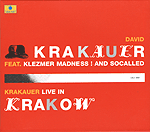
A musical homecoming
|
This review first appeared in the Winter 2003 issue of Turbula.
The Jewish community of Poland is tiny today – particularly by pre-Holocaust standards, when Poland was home to a large, vibrant Jewish population. And those few remnants of Poland's Jewish community that Hitler didn't kill, the lingering anti-Semitism of Poland nearly did after the war when most of the surviving Jews moved to Israel or the Americas.
Yet it was in Poland and the rest of Eastern Europe that the twin voices of European Jewry were born – Yiddish and klezmer – in the years after the Jews arrived during the Middle Ages, fleeing persecution in the West.
And so David Krakauer's choice of venue for his first live, concert recording was as much spiritual as aesthetic – to re-plant the flag of klezmer on its native soil, to reintroduce a modern, re-invigorated klezmer back to the home country. To bring the ghosts of a once-thriving community a bit of solace.
And of course a great time – Krakauer's ensemble isn't called Klezmer Madness without a big dose of chutzpah, but they back that up with as spirited, inspired and just plain crazed approach to playing as you'll ever hear.
"Krakauer Live in Krakow" was recorded over three nights last June in Cracow. The album opens with a short recording of traditional klezmer reminiscent of the sounds heard pre-war in Cracow being played over the sound system before Krakauer's ensemble begins doodling over it. Krakauer leads the way on clarinet, sounding nothing like klezmer great Naftule Brandwein and everything like the post-punk, post-industrial avant-garde musician he is. And guitarist Sheryl Bailey pulls sounds out of her axe like Hendrix and Jeff Beck – wild, distorted, fluctuating sounds that float and dart above the rest of the band's music.
Accordionist Will Holshouser, bassist Nicki Parrott and drummer Michael Sarin keep things somewhat grounded in the roots of klezmer, but then sampler/beatmaster Socalled comes into the mix, and pushes the band's sound beyond anything even famed klezmer rockers the Klezmatics have tackled. Only some of the more out-there bands on John Zorn's Tzadik label have pushed Jewish music quite as far out as Klezmer Madness.
But if experimental, the music here is hardly dry or intellectual. It is ethereal, this roiling, swirling, dancing, entrancing psychedelic folk music. There is nothing else quite like it, and it can hypnotize with its intricacy, its insistent beat, and its glorious solos.
